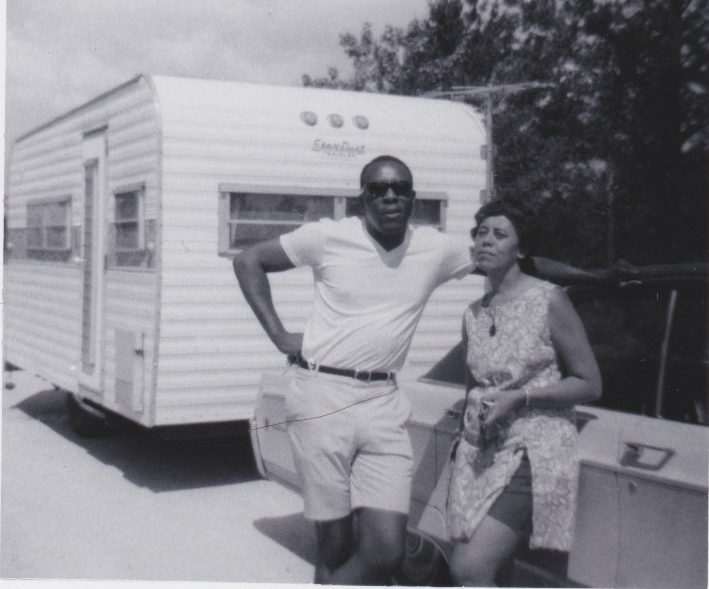Filmmaker Follows Grandparents Tracks in ‘Everyone But Two’
Intrepid travelers Benjamin and Frances Graham take center stage in the film Everyone But Two.
BALTIMORE — For most Americans, the idea of international travel is on a Covid-19-induced hiatus. Even coastal cruises and continental air trips may get a hard look, once the pandemic subsides. But for families like those of Baltimore filmmaker Carla Brown, life’s greatest adventures have always started at the end of their driveway and unfolded on the open road.
Carla’s most satisfying journey is the subject of her new documentary entitled, “Everyone But Two: The Life, Love & Travel of Benjamin and Frances Graham.”
Taking a circuitous road-trip with a single girl may sound like nothing new. But what makes this travelogue unique is that the roads Carla travels were traversed two generations ago by her grandparents, Benjamin and Francis Graham – an African American couple who gamely hitched a recreational trailer to their car the same week that the Civil Rights Voting Act was signed and the Watts riots erupted.
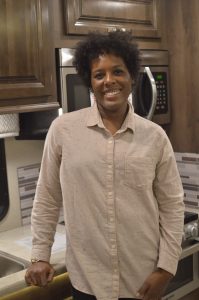
(Anthony C. Hayes)
“I think my first trip happened when I was in middle school,” remembered Carla, as we (along with her father – Air Force veteran Phillip Brown) slowly made our way through the 2020 Maryland RV Show back in February. “Our family flew out to LA and stayed there for a week, then drove to Phoenix and picked up an RV. We saw the Moon Crater, the Sedona Desert, the Petrified Forest.
“Actually, that trip didn’t go over so well with me and my sister,” explained Carla. “It was so hot! My parents went out to see everything, but we stayed in the trailer. We were toast by then.”
Luckily, Carla got over her aversion to temperature extremes in time to enjoy subsequent family trips – and undertake her epic film project. Since 2001, Carla has worked as a Baltimore-based artist, using photography, printmaking and film to visually examine themes of gender, race and family.
Because the Grahams had the freedom and flexibility of traveling in an RV, they didn’t experience the kind of overt racism and hostility they might have encountered, if they had attempted to stay in hotels or eat in restaurants. There were tensions in some of the cities they visited, but the Grahams persisted, and over the span of 35 years, they drove their car and trailer through every contiguous U.S. state.
“As of last year, I have officially concluded my travels for this film. We got started in 2014 with a drive to Florida, then kind of looped around the state before heading back. The second year, I took the advice of my father, who is most wise, and traveled to Alaska and Hawaii. For me, that was the most important part of my journey. My grandmother’s health was failing by then, and I was determined to be their surrogate and bring back the footage of those trips for them.”
Being a surrogate for her grandparents, Carla was aided in part by the extensive logs her grandfather kept for his many trips.
“I think I was only able to do part of a full trip once, but because of time and money, I broke the country down into quadrants.
“The first trip was to the Southeast; second was Alaska and Hawaii; third trip was to the Midwest and the Dakotas. That was when my grandmother got sick and went into hospice, so that trip got cut short. 2018 was our big trip. That was the Pacific Northwest and the coast. That covered a big chunk. And last year, we did the Northeast, so it’s really just been broken (up).
“Based on those regions, I used the logs and created an Excel spread sheet, so if I knew I was going into those regions, I’d identify each place that they went. Also, in the beginning I had an in kind relation with the state parks, so they were allowing us to stay for free. Some of that would determine where we went, but we always made sure to visit at least one place in each state that my grandparents had visited.
“In 2017, I made a solo trip to Jackson Hole, Wyoming, because – included in the minutia of his logs – my grandfather mentioned places that were worth seeing again.”
Did the Grahams have a favorite destination?
“My grandparents were interesting people. The more you tried to get to the heart of their travels, the more you got answers that you never anticipated. They just loved to travel. And even places they went before, they would often return. My grandmother called them sentimental trips, to see how things had changed since they were last there, perhaps thirty years ago. There were plenty of places they talked about, but I wouldn’t say one had any more significance over another.
What about Carla?
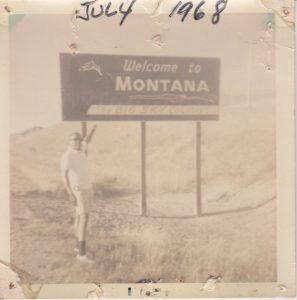
“I’d have to say Alaska. You can truly get lost – there is so much landscape up there. Plus, being there in the summer, when it stays sunlit at night. You really can’t explain what that feels like, unless you go.
“One place that surprised me was Oklahoma. We went to Robbers State Park – I believe that was a hide-out for Jesse James. It was really cool to walk in the footsteps of such a legendary character.
“I was also surprised to meet some couples who live the RV lifestyle year round. They had some very interesting stories to tell.”
Did the Grahams ever talk about traveling during the waning years of Jim Crow?
“We talked about that. One of the things they mentioned is that, growing up in Baltimore, their needs were always meet – even though it was segregated. They said they didn’t feel like they were missing out on anything, because they had entertainment, education – things that weren’t necessarily equal at the time.
“My grandmother recalled one story – I don’t remember which department store it was – but she wanted to buy a handkerchief for her mother, and the salesclerk said she’d have to come back in through the service entrance. They were very aware of racism, but they never allowed it to hold them back.”
Carla’s crew included a college friend, named Thomas, and a friend of his, named Sarah, who would go on to become Thomas’ wife. The rented RVs they used were courtesy of Cruise America and Go RV.
“Sarah is also a cinematographer. She is in the process of editing the film right now.
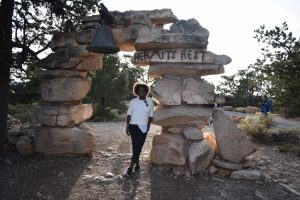
“We’re hoping to complete the production and release the film in 2021. But that will depend on time; and time is money, and money is the one thing I don’t have a lot of right now.
“I’m also looking to increase my mentorships, in regard to the many places I visited. There are so many layers to this story that I did not anticipate, when I set out to retrace my grandparent’s journeys through all the contiguous states, plus the two they missed. But I learned, for example, about how the state parks are engaged in a campaign to increase their audience of people of color.”
Funding a trip on a filmmaker’s purse has been a challenge for Carla. Luckily, she has found help for this project in the form of some generous grants. One $10,000 boost came in 2014 from the Greater Baltimore Cultural Alliance Rubies Artist Grant (Deutsch Foundation.) A second was in the form of a $20,000 development grant from Independent Film Project (IFP) & HBO.
“The rest was a lot of self-funding. It was somewhat disappointing that HBO didn’t pick up the project, but that means I’m not obligated contractually to any entity or distributor.”
We wondered if Carla has her eye set on any potential outlet?
“I would love to see it on PBS or integrated into curriculum in schools/colleges. But I must determine who my target audience is. I’m a public television fan, but I’d like it to have a life beyond PBS. It’s a work in progress.”
Carla said she often gets questions about her travel effort related to the recent film, The Green Book. But she also gets questions from Millennials, who see owning an RV as a viable option to securing a brick and mortar house.
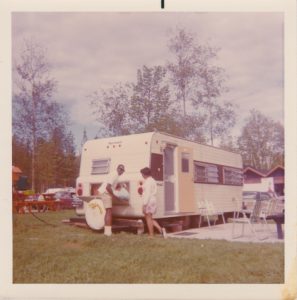
(courtesy Carla Brown)
“Millennials don’t see themselves having the kind of career stability their parents or grandparents had, so they are kicking that ceiling and asking, ‘OK – what is going to work best for me?’
“RVs are becoming a more realistic option. So many people can’t afford to rent, let alone buy a home, anymore. So, people are finding ways to live and work on the road, while exploring the world as they can.”
Can Carla see herself ever working on the road – perhaps as the next Charles Kuralt?
“In a sense, I’m doing that now, with a travel series called My Dear America.
“Jen Cooper is the series creator, and I’m holding down the hosting duties. My Dear America is a series that celebrates travel from a different perspective. We were able to start work on our Baltimore episode – right before things shut down – with one interview, and we are working on polishing it up for online content.”
Carla said that, once the lockdown has been lifted, she hopes to hit the ground running again. So, having spent the better part of two hours with Carla and her father at the Maryland RV show, I asked if she had settled on her dream RV?
“From the standpoint of a manageable drive, I am still leaning towards the Winnebago Travato. Once we can travel freely again, I am going to be ready.
“Strangely enough, I have checked on the two full-time RV couples we met on the road while making the film. They are both out there now on the road, so I suppose the pandemic hasn’t stopped everyone.
“The concept of the American dream has changed so much. That really crystallizes, when you think about how you are spending your time on this planet.”

Anthony C. Hayes is an actor, author, raconteur, rapscallion and bon vivant. A one-time newsboy for the Evening Sun and professional presence at the Washington Herald, Tony’s poetry, photography, humor, and prose have also been featured in Smile, Hon, You’re in Baltimore!, Destination Maryland, Magic Octopus Magazine, Los Angeles Post-Examiner, Voice of Baltimore, SmartCEO, Alvarez Fiction, and Tales of Blood and Roses. If you notice that his work has been purloined, please let him know. As the Good Book says, “Thou shalt not steal.”

